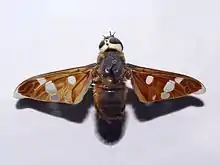| Hyperalonia | |
|---|---|
 | |
| Hyperalonia morio | |
| Scientific classification | |
| Domain: | Eukaryota |
| Kingdom: | Animalia |
| Phylum: | Arthropoda |
| Class: | Insecta |
| Order: | Diptera |
| Family: | Bombyliidae |
| Subfamily: | Anthracinae |
| Tribe: | Exoprosopini |
| Genus: | Hyperalonia Rondani, 1863 |
| Type species | |
| Anthrax erythrocephala Fabricius, 1805 | |
Hyperalonia is a genus of bee flies in the family Bombyliidae.[1]
Hyperalonia is one of the most striking genera of bee flies that can be found in the Neotropical region. The species included in this genus have a large bluish black body with several tufts of red and white hairs, bluish black wings and a yellow head with dark blue eyes.[2][3]

A male of Hyperalonia morio patrolling a patch of vegetation near the visitor center of Quebrada de las Higueritas in Lujan, San Luis, Argentina
Species
These seven species belong to the genus Hyperalonia:[4][5][6][1]
- Hyperalonia atra Painter & Painter, 1968
- Hyperalonia chilensis Rondani, 1863
- Hyperalonia coeruleiventris (Macquart, 1846)
- Hyperalonia diminuta Couri & Lamas, 1994
- Hyperalonia erythrocephala (Fabricius, 1805)
- Hyperalonia morio (Fabricius, 1775)
- Hyperalonia surinamensis Rondani, 1863
References
- 1 2 Evenhuis, N.L.; Greathead, D.J. (2015). "World catalog of bee flies (Diptera: Bombyliidae)". Retrieved 2019-07-02.
- ↑ A.M. CUNHA & C.J.E. LAMAS Redescription of the pupae of Hyperalonia morio morio (Fabricius), 1775 (Diptera, Bombyliidae, Anthracinae, Exoprosopini)
- ↑ http://biostor.org/reference/81205 Couri, M.S. and Lamas, C.J.E. 1994. A New Species Of Hyperalonia Rondani, 1863 (Insecta, Diptera, Bombyliidae, Exoprosopinae). Proceedings of the Biological Society of Washington 107, 119-121.
- ↑ "Hyperalonia". GBIF. Retrieved 2021-11-12.
- ↑ "Hyperalonia Rondani, 1864". Catalogue of Life. Retrieved 2021-11-12.
- ↑ Márquez-Acero, Ángela Sabrina; Lambkin, Christine L; Lamas, Carlos José Einicker (2020). "Cladistic analysis of Ligyra sensu lato (Diptera: Bombyliidae), with description of a new genus". Zoological Journal of the Linnean Society. 191 (3): 928–940. doi:10.1093/zoolinnean/zlaa065.
This article is issued from Wikipedia. The text is licensed under Creative Commons - Attribution - Sharealike. Additional terms may apply for the media files.